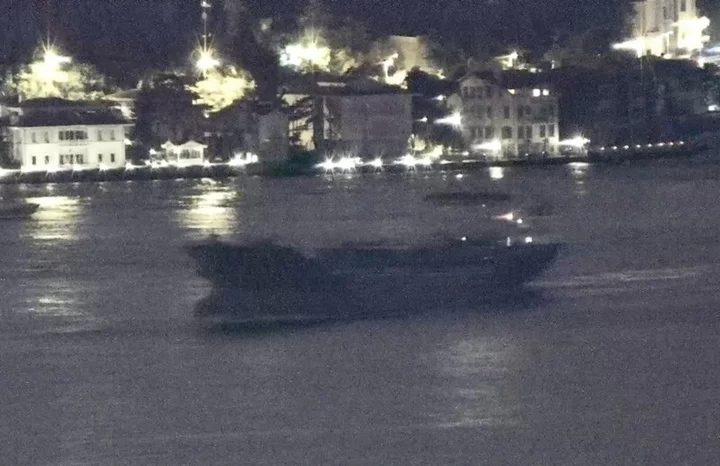By Guy Faulconbridge
MOSCOW (Reuters) -A Russian warship on Sunday fired warning shots at a cargo ship in the southwestern Black Sea as it made its way northwards, the first time Russia has fired on merchant shipping beyond Ukraine since exiting a landmark UN-brokered grain deal last month.
In July, Russia halted participation in the Black Sea grain deal that allowed Ukraine to export agricultural produce via the Black Sea. Moscow said that it deemed all ships heading to Ukrainian waters to be potentially carrying weapons.
On Sunday, Russia said in a statement that its Vasily Bykov patrol ship had fired automatic weapons on the Palau-flagged Sukru Okan vessel after the ship's captain failed to respond to a request to halt for an inspection.
Russia said the vessel was making its way toward the Ukrainian port of Izmail. Refinitiv shipping data showed the ship was currently near the coast of Bulgaria and heading toward the Romanian port of Sulina.
"To forcibly stop the vessel, warning fire was opened from automatic weapons," the Russian defence ministry said.
The Russian military boarded the vessel with the help of a Ka-29 helicopter, the ministry said.
"After the inspection group completed its work on board, the Sukru Okan continued on its way to the port of Izmail," the defence ministry said.
A Turkish defence ministry official said he had heard an incident had taken place involving a ship heading for Romania, and that Ankara was looking into it.
Reuters could not immediately reach the vessel or its owners for comment.
A senior adviser to Ukrainian President Volodymyr Zelenskiy said the incident was a "clear violation of international law of the sea, an act of piracy and a crime against civilian vessels of a third country in the waters of other states."
The adviser, Mykhailo Podolyak, added on X, the social media platform formerly known as Twitter, that "Ukraine will draw all the necessary conclusions and choose the best possible response."
Zelenskiy did not mention the incident in his nightly video address.
Natalia Humeniuk, spokesperson for the southern military command, stressed that the Russian statement had not been confirmed by other official sources. "I believe that attention should be drawn to this and the peculiarities of hybrid warfare should be kept in mind," she said in televised remarks.
"This statement could be a signal to all civilian vessels in the Black Sea," she said, and called for all transportation and navigation there to be conducted under international guarantees. Russia, she added, was trying to assert its right to stop a ship or deploy aircraft in the Black Sea and "face no consequences."
BLACK SEA AT WAR?
Firing on a merchant vessel will ratchet up already acute concerns among shipowners, insurers and commodity traders about the potential dangers of getting ensnared in the Black Sea - the main route that both Ukraine and Russia use to get their agricultural produce to market.
Russia and Ukraine are two of the world's top agricultural producers, and major players in the wheat, barley, maize, rapeseed, rapeseed oil, sunflower seed and sunflower oil markets. Russia is also dominant in the fertiliser market.
Since Russia left the Black Sea grain deal, both Moscow and Kyiv have issued warnings and carried out attacks that have sent jitters through global commodity, oil and shipping markets.
Russia has said it will treat any ships approaching Ukrainian ports as potential military vessels, and their flag countries as combatants on the Ukrainian side. Russia also struck Ukrainian grain facilities on the Danube.
Ukraine responded with a similar threat to ships approaching Russian or Russian-held Ukrainian ports. Ukraine also attacked a Russian oil tanker and a warship at its Novorossiysk naval base, next door to a major grain and oil port.
Ukraine and the West say Russia's steps amount to a de-facto blockade of Ukrainian ports that threatens to cut off the flow of wheat and sunflower seeds from Ukraine to world markets.
Russia dismisses that interpretation and says the West failed to implement a parallel agreement easing rules for its own food and fertiliser exports.
(Reporting by Guy Faulconbridge in Moscow, Huseyin Hayatsever in Ankara and Dan Peleschuk in Kyiv; Editing by Nick Macfie and Diane Craft)

